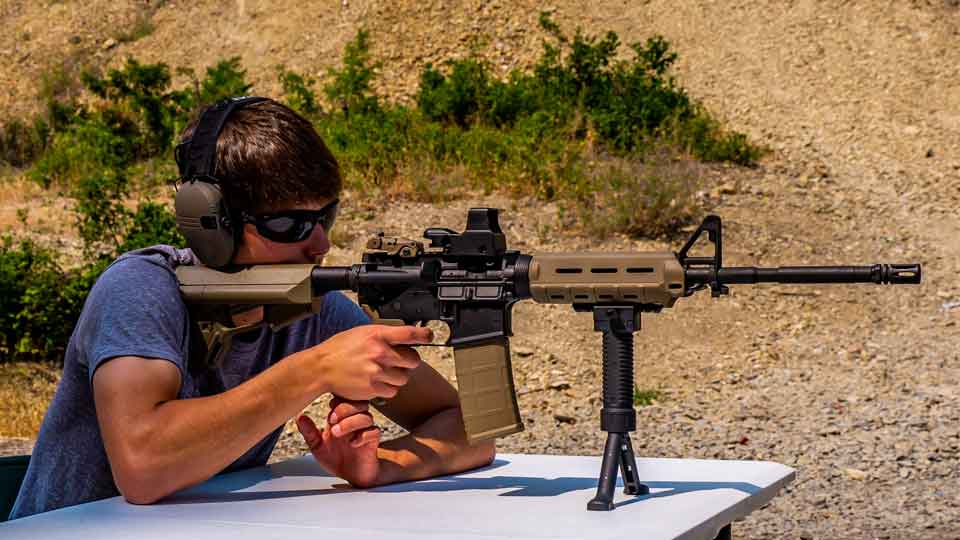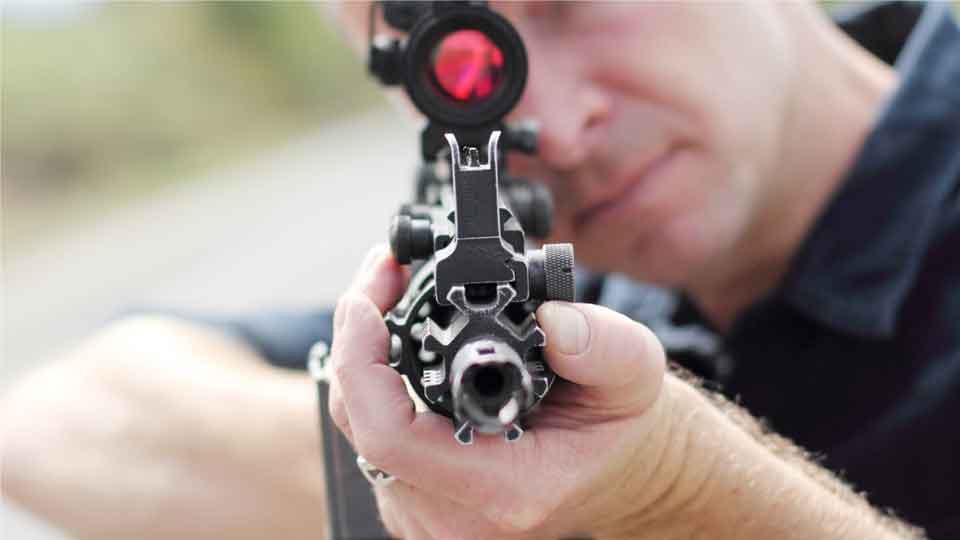Is the AR-15 suitable for home protection?
The AR-15 in the Context of Home Defense
The topic of home defense is a contentious one, filled with varying opinions and perspectives. Among the myriad options for firearms intended for home defense, the AR-15 frequently emerges as a subject of heated debate. Initially designed for military use, the AR-15 has transitioned into civilian ownership and is often touted for its adaptability and versatility. But is it suitable for home defense?
One of the main arguments favoring the AR-15 as a home defense weapon is its user-friendliness. Its lightweight and ergonomic design makes it easier to handle than many other firearms, potentially offering a level of control and accuracy that could be vital in a high-stress situation. The AR-15's standard .223/5.56 ammunition is also less likely to over-penetrate walls than handgun rounds, reducing the risk to others in the home or neighborhood.
However, the aspects that make the AR-15 adaptable and powerful also raise concerns. Critics argue that its high-capacity magazines and quick rate of fire make it overly lethal for home defense scenarios. The weapon's intimidating appearance can also be seen as a drawback, potentially escalating a situation rather than defusing it.
There are also legal considerations to keep in mind. Laws governing the use of lethal force in home defense vary from state to state, and using a high-capacity, semi-automatic rifle like the AR-15 can complicate legal matters should you ever have to use it. Before deciding on home defense tools, please always familiarize yourself with local laws and regulations.
Ultimately, the suitability of an AR-15 for home defense may come down to personal preference and specific needs. Its robust capabilities could serve as an asset in particular scenarios, but those capabilities could also be seen as liabilities, depending on the situation. It's essential to weigh these factors carefully and consider other options—such as handguns and shotguns—before choosing.
The Case For the AR-15: Versatility and User-Friendliness
The debate over which firearm is best suited for home defense is as old as the discussion surrounding gun ownership. While handguns and shotguns often dominate the conversation, the AR-15 has emerged as a strong contender. Advocates of the AR-15 as a home defense weapon point to its versatility, user-friendliness, and potential effectiveness in emergencies. Let's delve into these qualities to understand why some people prefer the AR-15 for safeguarding their homes.
Versatility
One of the most compelling arguments for the AR-15 is its unparalleled versatility. The firearm can be customized extensively to fit individual needs and preferences. You can add optics, switch out grips, or even quickly change the caliber. This adaptability allows homeowners to tailor the weapon for specific home defense scenarios—a long corridor, a large property, or a densely populated urban setting. Moreover, the AR-15 can be configured to hold a variety of attachments like flashlights or laser sights, enhancing its usability in low-light situations commonly encountered during home invasions.
User-Friendliness
For many people, the AR-15 is incredibly user-friendly. Its ergonomic design and lightweight nature allow for comfortable use, even over extended periods. Unlike some shotguns that can be difficult to handle for individuals with smaller frames, the AR-15's adjustable stocks can fit a broad range of users. The recoil is comparatively low, especially considering the weapon's firepower. This translates to higher accuracy, which could be crucial in high-stress, life-or-death situations where every shot counts.
Ammunition and Capacity
The standard ammunition in AR-15s, the .223 Remington or 5.56 NATO, is generally lightweight, allowing for more rounds in a single magazine. While some argue that high-capacity magazines are unnecessary or even dangerous, proponents counter that in a home defense situation, it's better to have extra ammunition and not need it than to need it and not have it. Moreover, this caliber offers a reasonable balance between stopping power and the risk of over-penetration through walls—a genuine concern in home defense scenarios.
Effectiveness
The AR-15's effectiveness as a home defense weapon is bolstered by its versatility, ease of use, and high-capacity magazines. Its rapid, accurate fire capacity provides a tactical advantage, particularly when facing multiple intruders. While all firearms demand respect and careful handling, the user-friendly features of the AR-15 can make it an accommodating choice for those less experienced in gun handling without sacrificing effectiveness. However, these advantages lead us to a critical discussion: Could this firepower be excessive for home defense?
Concerns and Criticisms: Is the AR-15 Too Much Firepower?
While the AR-15's adaptability and user-friendliness make it appealing to some homeowners, it is also subject to many concerns and criticisms, especially in the home defense context. One of the most frequently voiced criticisms is that the rifle provides "too much firepower," making it a potentially excessive and hazardous option for residential protection.
Firepower and Lethality
The AR-15 is designed for rapid, accurate fire, an asset in a military or law enforcement context. However, when applied to home defense, some critics argue that this level of firepower may be excessive. The high-capacity magazines and semi-automatic fire capabilities have been viewed as potentially escalating a dangerous situation rather than defusing it. Concerns exist that such potent capabilities may be prone to intentional or accidental misuse, thus increasing the risk of a tragedy.
Over-Penetration
Another significant issue revolves around the potential for over-penetration. Even though the AR-15's standard .223/5.56 ammunition is less likely to over-penetrate walls than some handgun rounds, the risk still exists, particularly when certain types of ammunition are used. Over-penetration poses a safety risk to other home residents, neighbors, and bystanders, as bullets could pass through walls, floors, or ceilings.
Safety Concerns for Inexperienced Users
The AR-15's complexity can also pose challenges for inexperienced or untrained users. While proponents of the weapon point out its ease of use, the fact remains that handling any firearm safely requires training and ongoing practice. Misjudgments—like failing to identify a target correctly, accidental discharges due to nervous handling, or not storing the weapon securely—could have severe consequences. For people who don't have extensive experience with firearms, learning to use an AR-15 safely could be a steep learning curve.
Legal Implications
The use of an AR-15 in a home defense situation might carry with it specific legal ramifications. Laws regarding the use of lethal force in home defense scenarios differ from state to state, and the employment of a high-capacity, semi-automatic rifle can introduce complexities into legal scenarios. For instance, some states limit magazine capacities for rifles, and others have restrictions on specific types of firearms, including "assault weapons," a category that sometimes includes the AR-15, depending on how the law defines it.
Public Perception and Social Responsibility
Finally, there is the question of public perception and the potential social implications of choosing an AR-15 for home defense. Because of its frequent appearance in media discussions, particularly around mass shootings, the AR-15 is a polarizing subject. Some homeowners worry that being known to own such a weapon could alienate neighbors or stir controversy within their community. The weapon's stigma could lead to unwanted attention or even make the owner a target for theft.
By examining these concerns in detail, one can better understand the complexities and challenges surrounding using the AR-15 in a home defense context. While firearm advocates tout its many advantages, weighing these against the genuine issues critics raise is crucial.
Legal Considerations: Ownership and Use in a Home Defense Scenario
When using an AR-15 for home defense, the legal landscape is a crucial aspect that cannot be overlooked. Laws can vary significantly from state to state, and local ordinances may impose additional restrictions even within states. Understanding these complexities is essential for any responsible gun owner.
Ownership Laws
The first hurdle to clear pertains to the legality of owning an AR-15. Federal law generally allows for the possession of AR-15s, but individual states can impose restrictions. For example, states like California and New York have stricter gun control laws, including bans on certain features commonly found on AR-15s, such as pistol grips or detachable magazines of specific capacities. Owners may need to modify their rifles to comply with state laws, which can be cumbersome and costly.
Castle Doctrine and Stand Your Ground Laws
How an AR-15 can be legally used in a home defense situation may also depend on your state's interpretation of the Castle Doctrine or Stand Your Ground laws. The Castle Doctrine generally allows individuals to use deadly force to protect themselves in their homes without the obligation to retreat first. Stand Your Ground laws extend this concept to any place where a person has a legal right to be. However, the kind of force that can be legally used may be subject to interpretation, and using a high-powered, semi-automatic weapon like an AR-15 could complicate legal defenses in some jurisdictions.
Magazine Capacity Restrictions
Another vital consideration is magazine capacity. Some states limit the number of rounds a magazine can hold. For instance, magazine capacities in states like New Jersey and Colorado are restricted to 10 and 15 games, respectively. If you use an AR-15 with a high-capacity magazine for home defense in these states, you could face criminal charges, regardless of the circumstances surrounding its use.
Reporting and Registration
In some areas, the ownership and transfer of "assault weapons"—a category that often includes the AR-15—require special reporting or registration. Failure to comply with these regulations can result in severe penalties, including the confiscation of the weapon and potential criminal charges.
Liability Concerns
Finally, there are broader liability issues to consider. If your AR-15 is used by someone else, intentionally or accidentally, you could face civil or even criminal liability, especially if it can be shown that the weapon was not stored securely. Secure storage laws exist in some jurisdictions, requiring gun owners to keep firearms locked in a closed container or equipped with a tamper-resistant mechanical lock or other safety device.
Understanding the legal implications of using an AR-15 for home defense is a critical responsibility accompanying owning such a weapon. Ignorance of the law is rarely considered an acceptable defense, so it's imperative to thoroughly research and understand state and local laws about AR-15 ownership and usage in home defense scenarios.
Alternative Options: Comparing the AR-15 to Other Home Defense Weapons
When choosing a weapon for home defense, there are multiple options to consider. The AR-15, with its pros and cons, is one among many. To make an informed decision, it can be helpful to compare the AR-15 with other popular choices for home defense, like shotguns and handguns. Understanding the relative strengths and weaknesses of each can help potential gun owners make a more educated choice.
AR-15: A Double-Edged Sword
The AR-15 stands out for its versatility and adaptability. It can be customized to fit individual preferences, has relatively low recoil, and offers high-capacity magazines. However, as discussed previously, these features can be viewed as liabilities. The rifle's high rate of fire and capacity for over-penetration can pose risks to household members and neighbors. Legal considerations are also specific to AR-15 ownership and use, varying by jurisdiction.
Shotguns: Simple yet Effective
Shotguns are often recommended for home defense due to their stopping power and the widespread pattern of their ammunition. This can be an advantage in close-quarters situations typical of home defense. The intimidation factor of a shotgun is also frequently cited as a deterrent. However, shotguns are generally heavier and harder to maneuver than AR-15s, particularly in confined spaces. The recoil is also much more significant, which can disadvantage more petite or less-experienced users. Lastly, the ammunition capacity is typically much lower than an AR-15, usually holding between 4 to 8 shells, depending on the model.
Handguns: Mobility and Convenience
Handguns offer the advantage of being lightweight, easy to maneuver, and convenient to store. This makes them an accessible choice for many homeowners, particularly those inexperienced with firearms. In a high-stress situation, the simplicity of a handgun can be a crucial advantage. However, they are generally less accurate than shotguns and AR-15s, especially at a distance. Handguns also have the issue of over-penetration; certain types of ammunition can easily pass through walls, posing a risk to others.
Stopping Power vs. Maneuverability
One of the primary considerations when choosing a home defense weapon is the balance between stopping power and maneuverability. Shotguns offer devastating stopping power but are unwieldy in tight spaces. Handguns are highly maneuverable but may lack the stopping power of a shotgun or an AR-15. The AR-15 strikes a balance here but comes with challenges, such as the potential for over-penetration and the public perception of the weapon.
Ammunition Choices
Another point of comparison is the range of available ammunition types. All three types of firearms offer a variety of ammunition designed for different purposes, from hollow-point bullets for handguns to specialized home-defense shotgun shells. The AR-15's standard .223/5.56 ammunition is a middle-ground option concerning penetration risk, but specialty rounds can also be employed to reduce this risk further.
Skill Level and Training
All firearms require effective and safe training, but the learning curve varies. Handguns are often considered the easiest for beginners to learn, followed by shotguns. The AR-15, with its more complicated controls and options for customization, might be better suited for those with a moderate level of firearms experience.
Ultimately, the choice of a home defense weapon should be tailored to an individual's specific needs, comfort level, and legal constraints. Each type of firearm has its merits and drawbacks, and what works best will depend on the unique circumstances of the homeowner.
Conclusion: Weighing the Pros and Cons for Your Specific Situation
Choosing an AR-15—or any firearm—for home defense is complex and deeply personal, laden with practical, ethical, and legal implications. While the AR-15 offers undeniable benefits like adaptability, high-capacity magazines, and manageable recoil, it also comes with drawbacks and risks. Concerns such as over-penetration, the potential for excessive use of force, and legal ramifications must be thoughtfully considered.
When contrasting the AR-15 with alternative options like shotguns and handguns, it becomes evident that no single weapon offers a one-size-fits-all solution. Shotguns provide high stopping power and a natural intimidation factor but could be more maneuverable and easier to handle, especially for inexperienced users. Handguns offer convenience and ease of use but often lack a rifle or shotgun's range and stopping power.
In terms of legal considerations, the AR-15 exists in a complex landscape. Ownership and usage laws vary widely depending on jurisdiction, and failing to adhere to local laws can result in severe consequences. Similarly, the very features that make the AR-15 versatile and powerful might also make its use more controversial in a court of law, should you ever have to defend your actions.
Therefore, choosing a home defense weapon requires weighing these factors against your needs. Are you comfortable with the learning curve associated with effectively operating an AR-15? Do you live in a state with restrictive firearms laws? Is the potential for over-penetration a concern in your living environment? These are just a few of the questions you should ask yourself.
The topic of firearms, particularly models like the AR-15 that have been linked with public controversies, can be divisive and emotionally charged. However, approaching the issue from an informed, balanced perspective is essential. It would be best to balance the weapon’s functionality and adaptability against the risks and responsibilities of owning this firearm.
In conclusion, an AR-15 can be both a valuable and a problematic choice for home defense, depending on your circumstances. It's essential to research, understand the legal landscape, and, most importantly, engage in honest self-assessment regarding your comfort and capability with the weapon. You can make an informed decision you'll be confident in.
Recent Posts
-
Best AR-15 Handguards - MOE SL Handguard
In the world of AR-15 customization, handguards not only protect the barrel but are pivotal in enhan …Feb 5th 2025 -
Budget vs. Premium AR-15 Rifle Scopes: Are Expensive Optics Worth It?
When it comes to enhancing your AR-15's performance, selecting the right AR-15 rifle scope is crucia …Feb 2nd 2025 -
Top Lightweight Red Dot Sights for Minimalist AR-15 Builds
Choosing the right red dot sight for your AR-15 is more than just picking a well-known brand—i …Jan 30th 2025








